

In the prologue, Eli compares the global Jewish community to the global queer community, noting, “We don’t always get it right, but the importance of showing up for other Jews has been carved into the DNA of what it means to be Jewish. (further reading, recommended titles, notes, image credits, index)Ī miniature manifesto for radical queer acceptance that weaves together the personal and political.Įli, a cis gay white Jewish man, uses his own identities and experiences to frame and acknowledge his perspective.

Maps, photographs, informative sidebars, points for discussion, and a recommended book list round out this accessible, engaging, and necessary addition to school libraries and classrooms.Īn excellent read, dismantling American mythologies and fostering critical reasoning about history and current events. A deeply felt connection to the Earth’s health permeates the text, along with the strength and resiliency that have kept Indigenous cultures alive. From the arrival of the first Europeans through to the 21st century, the work tackles subjects as diverse as the Dakota 38, the Ghost Dance and Wounded Knee, the American Indian Movement’s takeover of Alcatraz, and the Dakota Access Pipeline resistance. With an eye to the diversity and number of Indigenous nations in America, the volume untangles the many conquerors and victims of the early colonization era and beyond. The book urges students to think critically about private property and extractive industries, land conservation and environmental rights, social activism, the definition of what it means to be “civilized,” and the role of the media in shaping perceptions. Questioning the ideologies behind the belief systems that gave birth to America’s dominant origin stories, this book not only challenges the standard tale of European explorers “discovering” America, it provides an Indigenous perspective on key events. A young readers’ adaptation of the groundbreaking 2014 work, An Indigenous Peoples’ History of the United States, offering an important corrective to conventional narratives of our nation’s history.


 0 kommentar(er)
0 kommentar(er)
